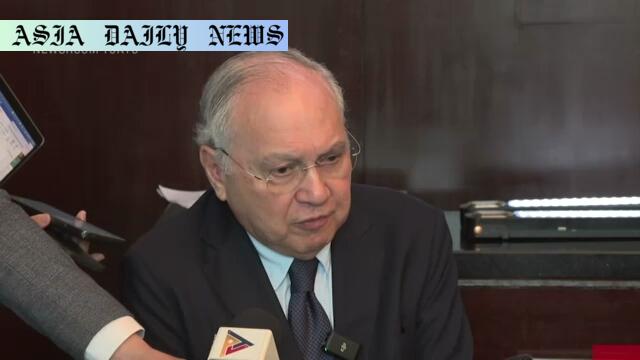Defense Agreements: The Philippine Ambassador confirms consistent military aid from the US amid evolving political landscapes.
- The US-Philippines defense agreements remain unchanged amidst evolving political dynamics.
- $336M military financing aid to be part of total $500M promised earlier.
- Philippine Ambassador underscores the need for economic and defense self-reliance.
- Manila seeks stronger ties with the US amidst South China Sea tensions.

US-Philippines Defense Ties Remain Strong
The Philippine Ambassador to the United States, Jose Romualdez, has reassured that the defense agreements between Manila and Washington will remain unchanged despite the political shifts under the Donald Trump administration. He emphasized that the pledged $336 million in military financing aid from the US government is secure. This assurance comes amidst concerns over recent freezes in international aid policies by the United States.
Romualdez made these remarks during a news conference, adding that the military aid is part of a larger package that totaled $500 million initially promised under Joe Biden’s administration. While not all the funds have been disbursed, he expressed confidence that the remaining balance would be made available in the coming years. This continuity in financial and military support reflects a steady relationship between the two nations, which is more crucial than ever, given the challenges present in the Asia-Pacific region.
Beefing Up Economic and Defense Capabilities
Romualdez went on to highlight the importance of readiness for possible future scenarios where international relations might shift. By urging nations to bolster their economic and defense strategies, Romualdez laid the groundwork for discussions on the Philippines’ self-reliance. He stated, “At the end of the day, each country now has to be ready to be able to beef up its defense and economic security.” This sentiment resonates widely as uncertainty characterizes the global political stage.
The United States’ support for the Philippines carries strategic importance, especially in the South China Sea, where maritime disputes with Beijing have been escalating. The need for a robust defense framework becomes evident against this backdrop, ensuring the safety of territorial waters and economic interests. With Washington’s pledge of aid, Manila can continue its efforts to maintain sovereignty and security in one of the world’s most contested regions.
Strengthening Alliances Amidst Regional Tension
Aside from the immediate concern of military aid, Ambassador Romualdez detailed ongoing efforts to strengthen ties between the Philippines and the US. He revealed that President Ferdinand Marcos Jr. is keen to meet with Trump in the coming spring to affirm and expand on the existing agreements. This potential meeting highlights Manila’s proactive stance in solidifying strategic alliances amidst China’s assertive moves in the region.
Romualdez’s comments also shed light on the broader implications of geopolitical shifts. While the Philippines prizes its deep historical ties with the US, the country acknowledges the necessity of carving a niche for defense and economic independence. Such preparations will not only secure autonomy but also ensure that future administrations, regardless of political dynamics, have the means and leverage to make decisions in the nation’s best interests.
Looking Ahead: Challenges and Opportunities
Meanwhile, regional experts believe that this steadfast partnership between the US and the Philippines creates a foundation for tackling broader challenges like the South China Sea dispute. Chinese maritime assertiveness has continued to present roadblocks for countries bordering its contested waters. The US military aid, coupled with ongoing defense agreements, ensures that Manila can counterbalance these activities effectively.
However, Romualdez’s focus on bolstering internal capabilities remains a key takeaway. While reliant on external allies, the Philippines aims to strike a balance between dependence and self-sustainability. By strategically planning its economic and defense priorities, the country signals its willingness to navigate the evolving dynamics of global relations efficiently and effectively.



Commentary
A Strong Alliance Amidst Uncertainty
The announcement by Ambassador Jose Romualdez regarding the continuity of US military support to the Philippines provides much-needed clarity in an increasingly volatile geopolitical climate. It is reassuring to see the United States and the Philippines maintaining a consistent defense partnership, despite changes in political leadership. This level of stability highlights the importance both nations place on safeguarding the Asia-Pacific region at a time of maritime disputes and shifting alliances.
Preparing for a Self-Reliant Future
While the guaranteed financial aid is a positive development, the ambassador’s remarks on self-reliance must not go unnoticed. His call to strengthen the Philippines’ economic and defense mechanisms reflects a forward-thinking approach. It demonstrates awareness of a potential future where external aid may not always align with a nation’s needs. By laying the groundwork for independent systems, the Philippines is taking pragmatic steps to ensure resilience amidst global uncertainty.
Strategic Importance of Regional Alliances
Another crucial takeaway is the potential meeting between President Marcos Jr. and Trump. Such high-level engagements underline the Philippines’ desire to continue fostering its relationship with the United States while addressing key concerns like Beijing’s dominance in the South China Sea. Regional allies like the Philippines are integral to ensuring peace and security in strategically significant areas. The sustained commitment from the US assures not only the Philippines but its neighbors as well.
In conclusion, while the US-Philippines defense ties inspire confidence, the underlying message from Romualdez is clear: countries must proactively develop their capacities for self-sustenance. By blending reliance on allies with increased self-sufficiency, the Philippines showcases its aspiration to be a resilient player in the global arena. This approach is commendable and worth emulating by other nations facing similar challenges.